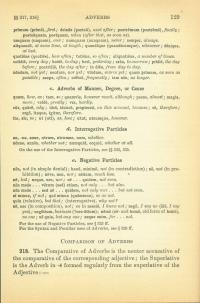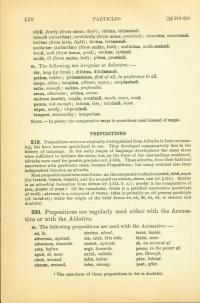218. The Comparative of adverbs is the comparative form of the corresponding adjective, declined in the neuter accusative; the Superlative is the adverb in -ē formed regularly from the superlative of the adjective.
cārē dearly (cārus dear)
cārius
cārissimē
miserē [miseriter] wretchedly (from miser wretched)
miserius
miserrimē
leviter (from levis light)
levius
levissimē
audācter [audāciter] (from audāx bold)
audācius
audācissimē
benĕ well (from bonus good)
melius
optimē
malĕ ill (from malus bad)
pêius
pessimē
a. The following are irregular or defective.
diū long (in time)
diūtius
diūtissimē
potius rather
potissimum first of all, in preference to all
saepe often
saepius oftener, again
saepissimē
satis enough
satius preferable
secus otherwise
sētius worse
multum (multō) much
magis more
maximē most
parum not enough
minus less
minimē least
nūper newly
nūperrimē
temperē seasonably
temperius
Note— In poetry the comparative mage is sometimes used instead of magis.


